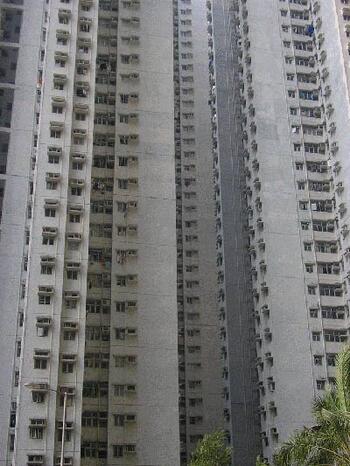
The Economist has published another in its city rating series, under the headline "The Best city in the World." This one was the result of a contest examining ways to elaborate on its rating system. The winner, Filippo Lovato, added a spatial dimension to the ratings, which included a 5 point rating of "sprawl," a pejorative term for the natural expansion of cities (which in this article means urban areas, areas of continuous urban development). Much of the urban planning literature is pre-occupied with combating urban sprawl, though urban expansion continues virtually everywhere around the world, as cities add population and become more affluent.
Livability for Whom?
As Jon Copestake, the Editor of the Economist Intelligence Unit’s Cost of Living and Livability surveys and I discussed in front of a Property Institute of Western Australia meeting, The Economist livability ratings are not aimed at average resident households, but rather at an international audience, such as corporate executives and corporate relocation services. This distinction can be important.
Hong Kong was top ranked for livability in the new Economist list. Doubtless this is accurate for well paid executives posted temporarily, who are granted substantial housing allowances by their employers and who can live in luxury condominiums within a short walk or taxi ride to their jobs in Central (the core of the Hong Kong central business district).
For local residents, livability is measured differently than for jet-setters or corporate executives.
Hong Kong: Smart Growth Model
With the developed world's highest urban area density and lowest automobile market share, Hong Kong beguiles anti-sprawl "smart growth" crusaders, for whom these two characteristics are the "two great commandments."
The entire Hong Kong urban form (urban area) is as dense as Manhattan at 67,000 per square mile (25,900 per square kilometer), but is more than twelve times the density of the New York urban area: the city and its “sprawling” surrounding suburbs (5,300 per square or 2,100 per square kilometer). Similarly, Hong Kong is somewhat more dense than the ville de Paris, but seven times the density of the Paris urban area (9,800 per square mile or 3,800 per square kilometer). This hyper-density combined with one of the world's strongest central business districts give Hong Kong a nearly 80% mass transit share of motorized travel, nearly 10 times that of the New York urban area and more than three times that of the Paris urban area (Figure 1).
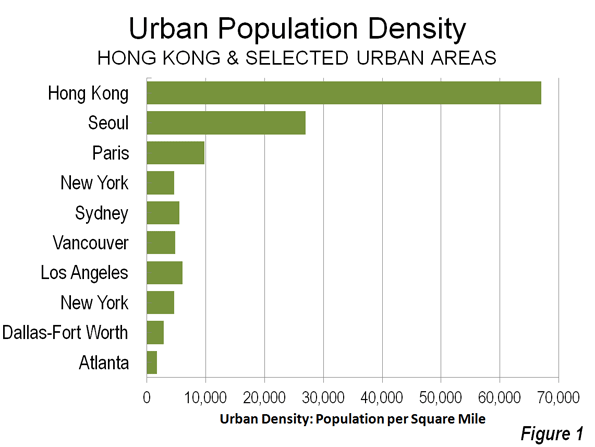
"Livable" Hong Kong?
To its permanent and unsubsidized residents, though, Hong Kong's spatial Nirvana does not provide much in terms of livability.
Excessively Long Commutes Hong Kong's high density indicates that jobs and houses are relatively close to one another, which should indicate that commute times would be short. Not so. Commutes are among the longest in the developed world – only Tokyo residents take more time to get to work. (Figure 2)
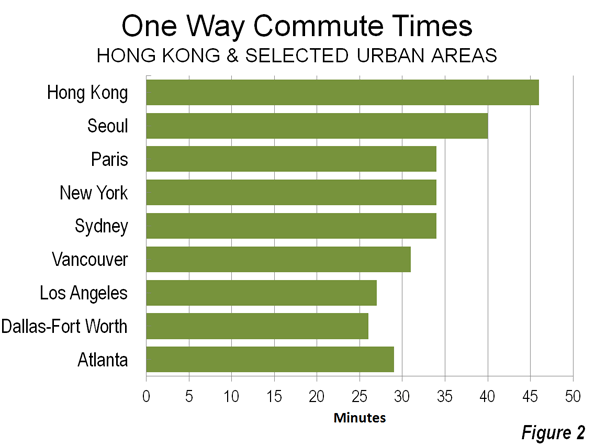
The average one way commute is 46 minutes in Hong Kong, well above the developed world average of 33 minutes for urban areas over 5,000,000 population. By comparison, commuters in similarly sized Dallas-Fort Worth (26 minutes) and "gridlocked" Los Angeles (27 minutes) get to work much faster. Commuting also takes longer in Hong Kong than in Paris (34 minutes) and London (37 minutes). Lengthy commutes impose an economic price and make Hong Kong less livable.
Exorbitant House Prices: Hong Kong’s housing, the largest household budget item, is profoundly unaffordable. The 8th Annual Demographia International Housing Affordability Survey rates Hong Kong as the most costly out of 325 metropolitan areas. The median house price in Hong Kong's is 12.6 times the median annual gross household income (the "median multiple"), which leaves little more than a pittance in discretionary income for many households. Perhaps this is why Hong Kong's fertility rate has fallen to rock bottom levels near the lowest on the planet – people cannot afford kids.
Even during the housing bubble, coastal California never became so unaffordable. Hong Kong housing is nearly twice as costly as San Francisco (6.7 median multiple) and more than four times as costly as Dallas-Fort Worth (2.9), Houston (2.9) or Atlanta (Figure 3).
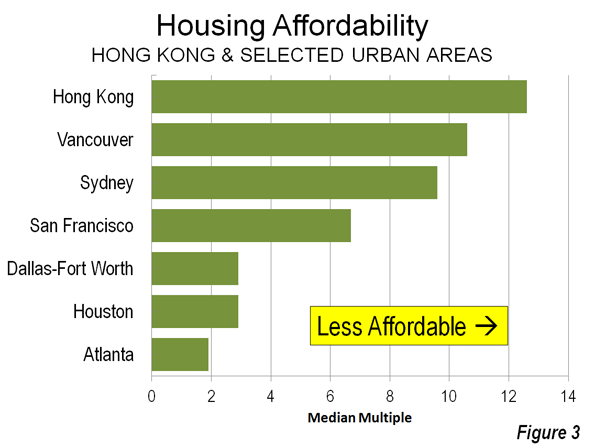
Concern about housing affordability has become so intense that it is an issue in public protests, which The Economist reports to have drawn up to 400,000 people earlier this month (link to photo). Exorbitant house prices make Hong Kong less livable.
"Sprawling" Atlanta
Things are much different in "sprawling" Atlanta, which The Economist's spatial list ranks as the worst among the US entries. Atlanta is at the opposite end of the density spectrum from Hong Kong, with the lowest urban population density of any major developed world urban area.
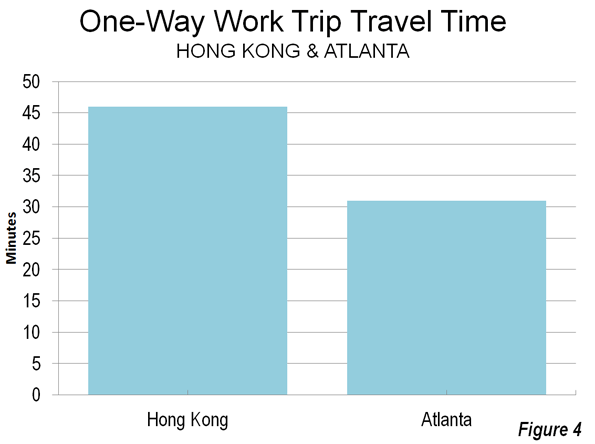
Short Commutes: Atlanta's low density would suggest that jobs and houses must be so far apart that commute times are very long. Again, not so. Atlanta commuters have among the shortest travel times (29 minutes) in the world among urban areas of similar size (see Note: Jobs-Housing Balance). Shorter travel times make Atlanta more livable (Figure 4).
Other similarly sized US urban areas do even better, such as Dallas-Fort Worth (26 minutes) and Atlanta's leaders know that traffic congestion need to be eased to improve Atlanta's competitiveness. But the political process politics has offered a dysfunctional plan that would spend more than half of a new tax on mass transit, which is used by only the one percent. Less than one half of the money would be spent on the roads that the 99 percent use (Figure 5). Any strong growth will overwhelm the stingy highway improvements, and if the voters approve the July 31 referendum, Atlanta's travel time advantage over Hong Kong could narrow.
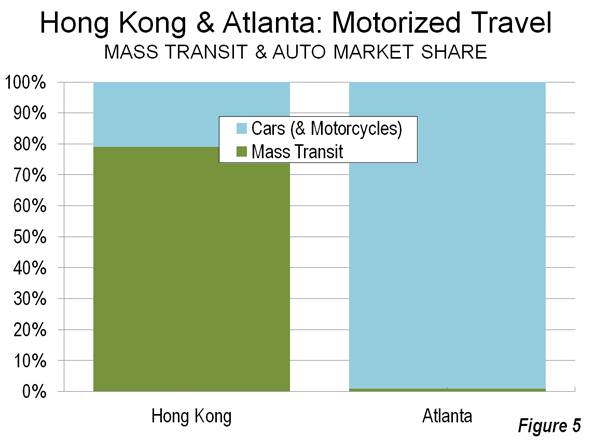
Affordable House Prices: Despite being the bane of planning orthodoxy, Atlanta's has far better housing affordability than Hong Kong. The median multiple is 1.9, compared to Hong Kong's 12.6. Hong Kongers pay six times as much of their income for their houses (which are also two-thirds smaller than in Atlanta). So far, there have been no protests against Atlanta's low house prices. Better housing affordability makes Atlanta area more livable.
The Hong Kong Model
Hong Kong's high density (more than double that of any other large developed world urban area) is an accident of history, the result of geo-politics, not urban planning. Further, China's impressive new cities are being built at a small fraction of Hong Kong densities. Yet, Hong Kong has given much to the world. Not least is the fact that its market oriented economy served as the model for economic reform which has radically improved livability for hundreds of millions of people in China.
Further, Hong Kong is attractive as one of the world's premier tourist destinations. For aficionados of cities, like me, Hong Kong is intensely interesting. It is the ultimate in urbanization. It is a wonderful place to visit and to live – if someone else is paying the bills.
However, the interplay between Hong Kong's hyper-dense urban form and its transportation system burdens Hong Kong residents dearly, both in time and money. For them, Hong Kong is hardly a model of livability.
-------------------
Note: Commuting in Dallas-Fort Worth: Larger Dallas-Fort Worth has faster average work trip travel times than Atlanta, at 26 minutes, which are principally are aided by its much superior freeway (motorway) systems and arterial street (non-freeway boulevard) systems. Transit carries about one-half the share (0.6%) of travel in Dallas-Fort Worth as in Atlanta.
Note: Jobs-Housing Balance: One of urban planning's principal goals is to achieve a jobs-housing balance, wherein jobs and housing are so close that people can walk to work or use transit, minimizing travel times and distances. Hong Kong is best in this, with its small urban footprint. Yet, despite having achieved the ultimate, it takes Hong Kongers much longer to get to work than Atlantans. The comparison of Hong Kong and Atlanta shows this theoretical measure to be of little importance. A better indicator of the jobs-housing balance is practical – how long it takes to get to work.
Note: Travel Times by Car and Transit: Mass transit has substantially longer average work trip travel times than cars in nearly all of the world metropolitan areas for which data is available. In Atlanta, the average work trip by car (single-occupancy) was 29 minutes in 2007, compared to 54 minutes for mass transit.
----------
Wendell Cox is a Visiting Professor, Conservatoire National des Arts et Metiers, Paris and the author of “War on the Dream: How Anti-Sprawl Policy Threatens the Quality of Life.”
Photograph: Kowloon, Hong Kong (by author)













Wonderful being going to
Wonderful being going to your blog once again, it's been weeks to me. This report in which i am silently laid for such a long time. I would like this information to complete my own project within the school, and possesses exact same topic using your.. I'm not going to lie, My brother recommended I would possibly like this website. - toko tas branded online
They also confirmed with
They also confirmed with Kellogg's that the Frosted Mini Wheats Blueberry Muffin cereal contained no blueberries, but that the "Blueberry Muffin" name was used to describe the flavor of the product, and was in compliance with applicable laws and regulations.
get info all
Atlanta
My now retired uncle and aunt lived in a number of cities during my uncles long career in adverting. Out of those places their favorite place they lived? Atlanta, Why? They had an awesome house on an acre lot with lots of trees, that didn't cost an arm and a leg. My uncle commute was the shortest of all the places they lived, about five minutes to a really nice office park.
The place they liked the least. NYC. Long expensive commute, townhouse that cost a fortune but had neighbors on top of them.
Thank you pertaining to
Thank you pertaining to giving this excellent content on your web-site. I discovered it on google. I may check back again if you publish extra articles.. - modem murah
Another excellent article by
Another excellent article by Wendell Cox. This is such a clear statement on the questionablity of the "high density utopia".